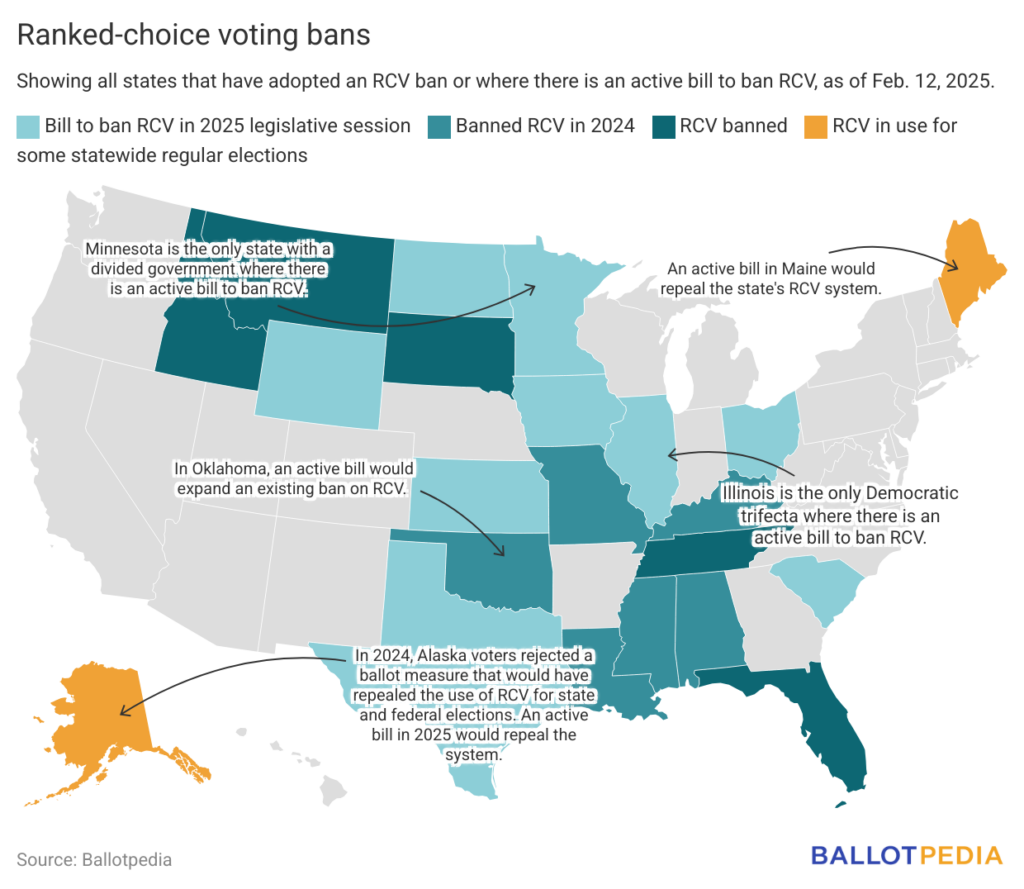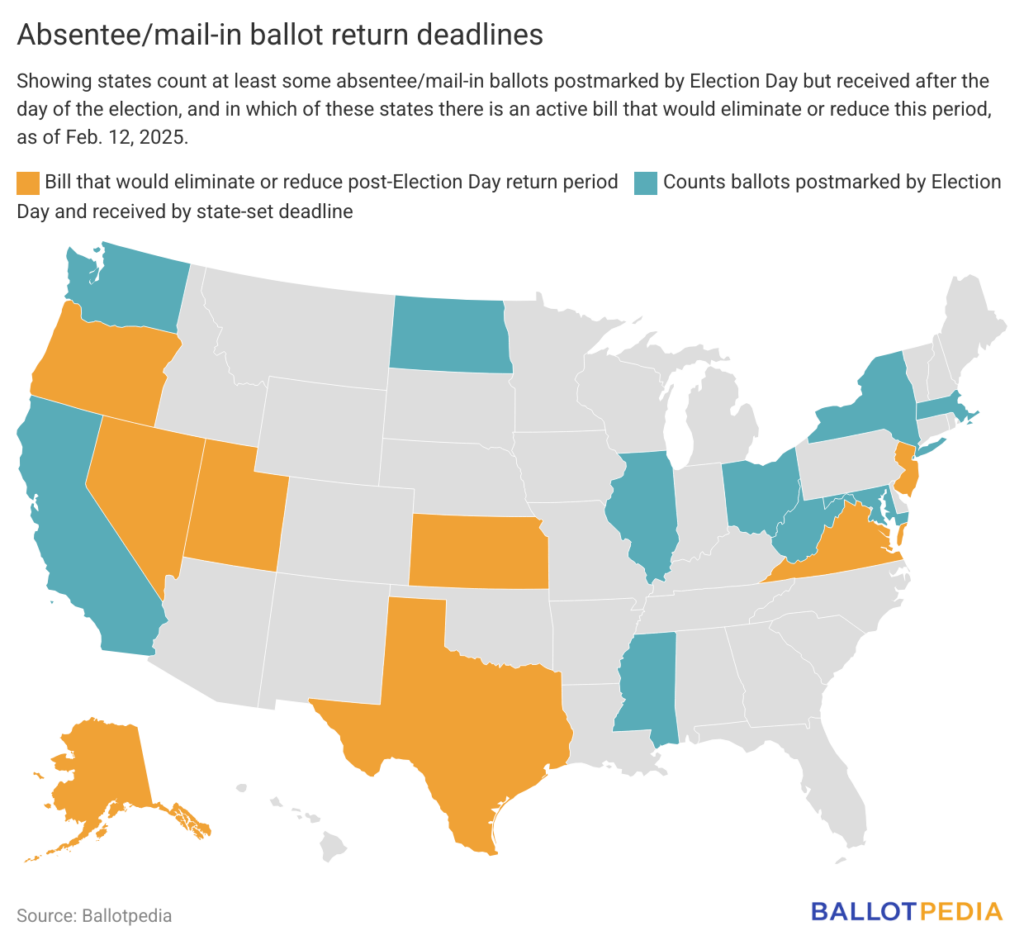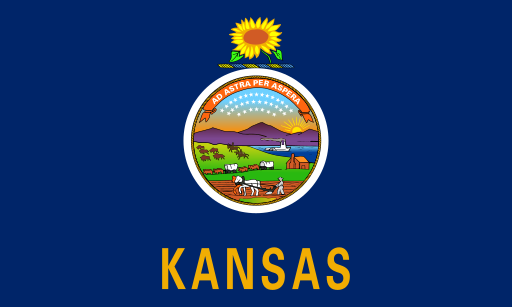All but two state legislatures are currently convening their regular 2025 legislative sessions. Lawmakers in these states have already introduced more than 2,300 bills related to election administration this year.
Among states where lawmakers have advanced election policy bills is Kansas.
Kansas has a divided government and is one of two states, along with Kentucky, with a Democratic governor and a Republican veto-proof state legislative majority. There are 23 Republican trifectas, 15 Democratic trifectas, and 14 states with divided governments.
As of Feb. 12, lawmakers in Kansas had introduced 26 bills related to elections, and four of these bills had passed a legislative chamber. In 2024, just one bill related to elections became law in Kansas. Bills legislators have advanced this year would make more consequential changes to the state’s election laws. Some of the topics align with legislation Republican-controlled state governments adopted elsewhere in recent years, while others are emerging as possible Republican priorities moving forward.
Banning ranked-choice voting (RCV):
On Feb. 6, Kansas lawmakers voted 29-10 to advance SB 6, a bill that would ban the use of ranked-choice voting for elections at any level. The vote was largely along party lines, with all but one Republican voting to advance the bill, and all Democrats opposed.
Last year, six states — Alabama, Kentucky, Louisiana, Mississippi, Missouri and Oklahoma — passed laws banning the use of RCV, more than in any other year. Republican lawmakers were the primary supporters of all of these bills, and all but one of these states had a Republican trifecta at the time the law passed. In the one state with a divided government to pass such a law, Kentucky, the ban became law through an override of Gov. Andy Beshear’s (D) veto. Heading into 2025, 11 states had adopted laws prohibiting the use of RCV, all since 2022.
In 2025 legislative sessions, state legislators have introduced 11 bills in eight states that would ban RCV. Nine of these bills are in states with Republican trifectas, while one is in a state with a Democratic trifecta, and one is in a state with a divided government. At the time of publication, SB 6 in Kansas was the only such bill that has advanced from a legislative chamber, while one other bill related to RCV, Virginia’s SB 10009, which would allow the use of RCV for some local elections, has advanced.

Last year, no legislation to expand the use of RCV passed a state legislature, although voters in two states and D.C. did adopt RCV for some local elections. Elsewhere, voters rejected statewide ballot measures in five states — Arizona, Colorado, Idaho, Nevada, and Oregon — that would have implemented RCV for certain elections.
President Donald Trump (R) has criticized RCV, and the American Legislative Exchange Council, which describes itself as a “membership organization of state legislators dedicated to the principles of limited government, free markets and federalism” has published model legislation to ban RCV.
Returning absentee/mail-in ballots:
On Feb. 11, Kansas lawmakers passed SB 4 out of the state senate by a 29-10 vote. The bill advanced almost entirely along party lines, with one Republican and all Democrats opposing passage.
The bill would require that voters return absentee ballots by 7 p.m. on the day of an election. Currently, state law requires that voters return their ballot in-person on the day of the election, or postmark their ballot by Election Day. The state counts ballots postmarked by Election Day if received by the third day following an election.
At the time of publication, 18 states and D.C. count ballots that are returned by a deadline after Election Day set by state or local law if the ballot is postmarked by Election Day. No state allows election officials to count ballots postmarked or submitted after the day of an election.
Of the 18 states that count at least some ballots postmarked by Election Day but returned after the day of the election, four states have divided governments, eight have Democratic trifectas, and six have Republican trifectas. Of these states, there are active bills that would eliminate grace periods in eight states, including Kansas. No other active bill has advanced.

Gov. Laura Kelly (D) vetoed a similar bill in 2023. According to the Kansas Reflector, lawmakers adopted the grace period in 2017 after “then-Secretary of State Kris Kobach asked the Legislature to pass the law in response to slow U.S. Postal Service delivery.”
Supporters of eliminating the grace period have argued that they provide opportunities for voter fraud, that postmark dates are unreliable, and that requiring ballots be received by Election Day would bring the state more in line with the national norm. Opponents of the bill have argued that other states without grace periods send absentee ballots to voters earlier than Kansas does and that the change would unfairly penalize voters who submit a ballot by the legally required deadline.
Noncitizen voting and voter list maintenance:
Two other bills that have advanced from the state house of representatives include election policy laws introduced and adopted by Republican lawmakers elsewhere. These bills address noncitizen voting.
HCR 5004 would refer a constitutional amendment to the state’s voters asking them whether to modify the state’s constitution to more explicitly prohibit noncitizens from voting in elections in the state. Currently, noncitizens are not allowed to vote in any elections in the state, and the constitution stipulates that an individual must be a U.S. citizen to vote in elections in the state. The amendment would add language that explicitly states that no person who is not a U.S. citizen will be allowed to vote in the state. The other bill, HB 2020, would require the director of the division of motor vehicles to provide a quarterly report to the secretary of state that includes details about noncitizens issued a driver's license.
Both bills passed the legislature’s lower chamber largely along party lines, with Democrats unanimously opposing HB 2020, and all but three Democrats voting against HCR 5004.
In 2024, voters in eight states approved ballot measures modifying constitutional language that bans noncitizen voting. Legislators placed all eight ballot measures on the ballot. Similar to the effort in Kansas this year, noncitizens were not permitted to vote in any of these states prior to passage of the constitutional amendments.
Elsewhere this year, legislators have introduced more than 60 bills related to the topic of noncitizen voting. Included among these bills are more Republican-led efforts to place constitutional amendments on voter’s ballots to modify existing noncitizen voting bans, bills that would add language to drivers’ licenses indicating when the possessor of a license is not eligible to vote, and legislation that would increase the frequency that election officials audit and remove noncitizens from voter registration lists.
Additional links:



